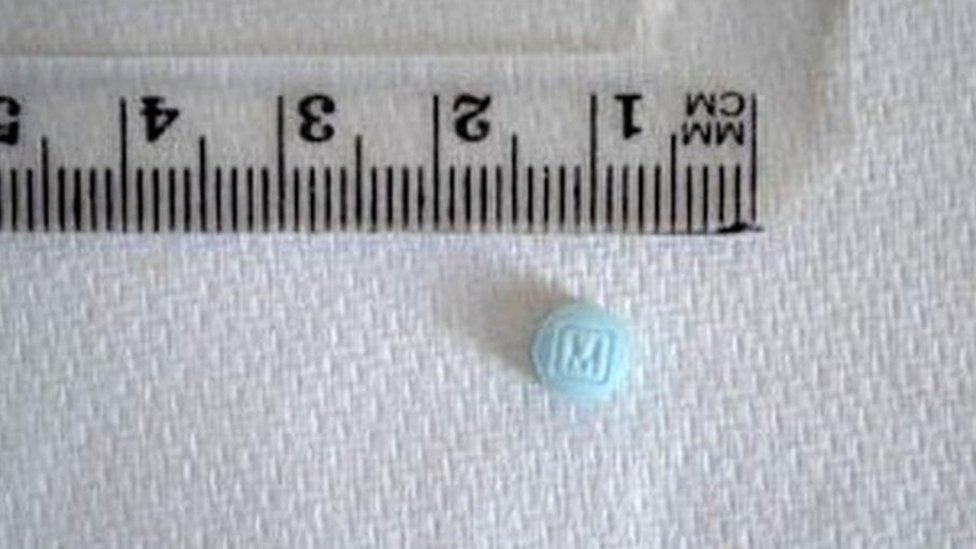Nitazenes: Warning over super-strength street drugs linked to deaths
- Published

The warning said the nitazenes were mostly found as small blue counterfeit oxycodone tablets - shown here on the Welsh Emerging Drugs and Identification of Novel Substances (WEDINOS) website
A charity has issued a warning over a new wave of super-strength street drugs detected in Scotland.
Synthetic opioids called nitazenes have been linked to nine deaths in Scotland in the last six months.
The drugs - a form of painkiller - have been detected in supplies of heroin and benzodiazepines this year.
Kirsten Horsburgh from the Scottish Drugs Forum said Scotland had been "slow to heed warnings" about their emergence.
She warned that health authorities must expand drug-testing services to prevent more deaths.
It comes as National Crime Agency (NCA) confirmed at least 54 people died in the UK as a result of taking nitazenes since June.
'Imperfect picture'
The Scottish Drugs Forum said nitazenes may be present in other drugs including cocaine.
Ms Horsburgh said: "We have an imperfect picture of what is happening in Scotland.
"This is because we been slow to heed warnings and adequately prepare.
"We need to act now in the face of the threat posed by these drugs being in the supply."
Public Health Scotland (PHS) issued an alert in January, external after multiple detections in the Lothian, Grampian and Greater Glasgow health boards areas.
And in October, PHS updated the alert after the substances were found in post mortem results.

What does the alert say?
The Rapid Action Drug Alerts and Response (Radar) alert warned that nitazenes were mainly found in the form of counterfeit oxycodone tablets - usually blue and stamped with '30' or 'M'.
It was also found in white paper or blotter form in prison seizures.
Four types of nitazenes were detected in Scottish drug deaths this year - metonitazene, isotonitazene, protonitazene and N-pyrrolidino-etonitazene (etonitazepyne or NPE).
Originally developed as a painkiller, nitazenes have never been approved for use as a medicine in the UK.
It is understood the UK government plans on reclassifying a number of synthetic opioids.
However, nitazenes are already outlawed under the 2016 Psychoactive Substances Act.
The Scottish Drugs Forum said the use of synthetic opioids such as nitazenes could lead to substances such as fentanyl introduced into the illicit drug supply.
Ms Horsburgh continued: "We need to improve and expand our capacity for testing drugs and testing for synthetic opioids specifically.
"We are currently dependent on a service established many years ago in Wales which is supported by Public Health Wales and the Welsh government.
"That service allows people to send samples for analysis and have the results published online so that people know what is in the drugs they use or might use."
The charity has also produced an online booklet warning about the substances.
'Increased risks of overdose'
Earlier this week, the NCA said it believes nitazenes are being produced in illicit labs in China and often enter the UK in the post.
It is then mixed with heroin by crime groups.
Elena Whitham, the Scottish government's drug policy minister, said she was "concerned" about its appearance.
She said: "We know that these synthetic opioids are being found in a range of substances and they bring with them increased risks of overdose, hospitalisation and death.
"I would urge everyone to follow the guidance issued by the Scottish Drugs Forum and partners to protect themselves and others.
"The importance of carrying naloxone to reverse an overdose also can't be understated. With the additional potency of these synthetic opioids, being in possession of a kit - or more than one as the increased strength might require more than one administration - could be crucial in saving lives."
Related topics
- Published11 December 2023

- Published17 September 2023
